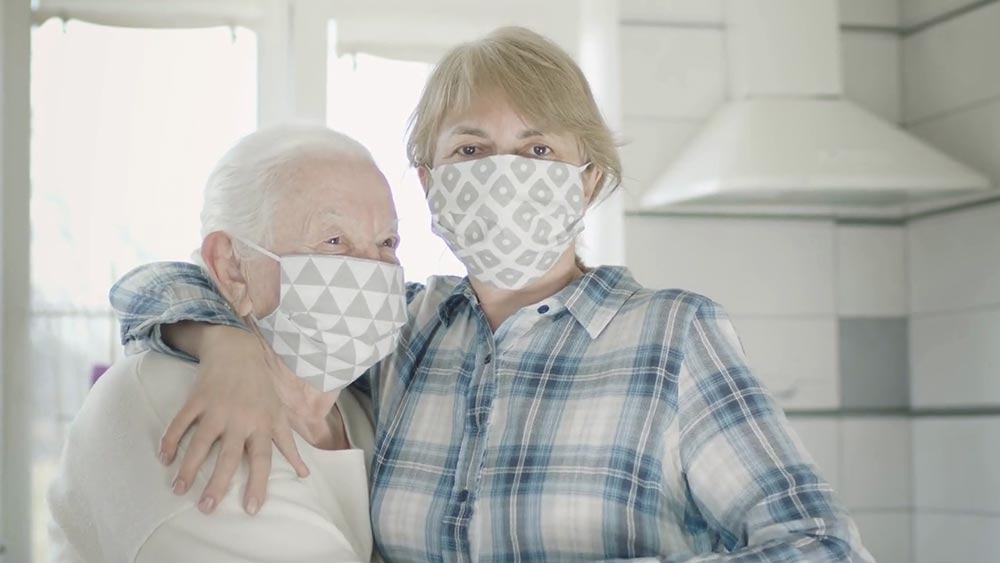Live-in carers in times of COVID-19. The Covid 19 pandemic has demonstrated more than ever the importance of caring for our elders with in-house carers.
The distressing reality that they are living during the times of Covid 19. The danger that this disease represents for them has made us understand the permanent care that our elders must have.
It should be remembered that at the end of 2020, while in the younger ages the mortality rate of the coronavirus was less than 1%, in the older age groups it reached 18%.
As a result, older people are the most in need of medical care. 25% of infected people over the age of 70 need hospital care during the peak of the pandemic.
In fact, the fate of each older adult person has been far from certain. This is the case with residential homes, where the situation has been tragic. This is why seniors in residential homes will be the first to receive the coronavirus vaccine in January 2021.
25% of infected people over 70 have needed hospital care
At home, the reality has also been complicated by the fear of contagion from our elders. But thanks to the work of the carers, families have the peace of mind that their family member is receiving the care they require in these difficult times. For this reason, we highlight the virtues of the great work that carers are carrying out at home.
Personalised care
The needs of each older adult are very different. They depend not only on the types of pathology they have, but also on the person themselves. One of the main tasks and, in turn, virtues of the carer is that they detect these specific needs and adapt their care to them.
An example of this is these days when many senior people who need care such as walking to avoid losing mobility, cannot leave their home. The carer adapts their routine to this sudden and lasting circumstance. They must also prepare substitute activities to carry out in their own home and that generate the same benefit.
Live-in carers in times of COVID-19: Caregiver-older adult bond
This individualised attention creates something that only this type of service can build. An emotional bond between the carer and the older person.
Thanks to this strong bond, our family member will see the carer as the figure to trust and with whom they can develop their full autonomy.
Therefore, in this moment of distress, the carer will be a fundamental pillar so that her state of mind does not decline and she faces these days in a positive way, maintaining the tranquillity that everything around her is under control.
Live-in carers in times of COVID-19: Staying at home
Waking up in your own room, walking down the corridor, looking out the window and contemplating the streets you have always walked down, will be the best medicine for the stress that society is suffering behind your home.
His own home is the place where our family will feel most secure to face the difficult days ahead.
Peace of mind and communication
Knowing that there is a person entirely dedicated to the care of your family member gives the family great peace of mind. It also offers security that other services would not have.
This type of care allows direct and immediate communication between the family and the carer, something that is essential to avoid constant family concern and worry about how your relative will be at this time.
Thanks to this permanent communication, the visits that we can no longer make to our relative can be replaced by video calls. We can spend long periods of time chatting which make the course of the day easier for everyone.
Live-in carers in times of COVID-19 – Receive specialized attention
The carers we select at Nomenial are professional carers. When the patient requires highly specialised care due to the type of pathology they suffer from, we select the carers on the basis of their specialisation in attending to this type of ailment. We always commit to find a carer for every need.
Thanks to this valuable knowledge and extensive experience in caring for the older adults, our carers know exactly what the patient needs at each stage of the illness.
Therefore, if during these weeks, our family member cannot attend his rehabilitation classes or attend medical programmes, the carer has the ability and knowledge to attend to the medical instructions by phone and apply them at home.
The feeling of abandonment disappears
One of the most painful feelings when we have a family member admitted to a nursing home is the doubt that he or she will feel abandoned.
This feeling of abandonment can be exacerbated by not allowing communication with family members. Also, not fully understanding what is happening around them.
Remaining in your own home completely eliminates this feeling of desolation. It can also prevent any strong mood swings, which are vital in such a situation.
Doubts about the choice of residence
Without a doubt, the first and most complicated step, is the choice of this one. There are so many possibilities and, when we investigate, so many different opinions for each one. It is very difficult to know how our family member will be cared for in it.
Under normal conditions, and even more so today, we are uncertain as to whether we have chosen the most suitable residence. We are also uncertain whether at such a difficult time as this, we have the capacity to respond to it.
Nomenial: free selection service for coronavirus
In Nomenial we are aware of the complicated and overwhelming situation that residences are experiencing these days as a consequence of the coronavirus. We understand the dramatic scenario in which residents and employees find themselves.
For this reason, in this third wave we continue to offer our selection services free of charge to families with fewer resources. This is so that their relatives can be cared for in complete safety.
Our older adults deserve to face in a dignified way this complicated reality that we all live. No family member, no senior person who watched their days in peace deserves to suddenly find themselves in an insurmountable and frightening situation. The virtues of home care stand out in these difficult times. They show us, once again, the importance of having our elders by our side.







